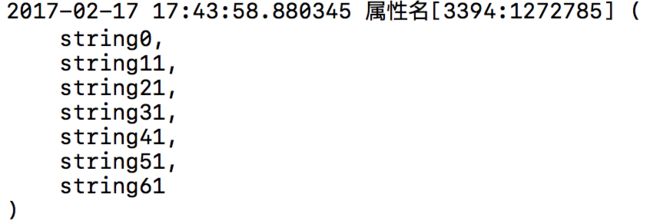以前我们APP都是使用mj的mode赋值,但是感觉有点繁琐,每次都要导入第三方,太过麻烦,于是到网上查找了一下可以使用的方法,总结一下,第一次写,写的不好请大家原谅啊。
首先想到的是读取类的属性名称,拿到名称之后,与从后台拿到的数据进行对比取值,于是马上上网查找读取类的属性名称的方法。代码如下:
//这个是一点要导入的不然会出错
//这个是一点要导入的不然会出错
//这个是一点要导入的不然会出错
//重要的事情要说三遍
#import
- (NSArray*)attributeArray
{
NSMutableArray*props = [NSMutableArrayarray];
unsignedintoutCount, i;
//读取所以的属性信息
objc_property_t*properties =class_copyPropertyList([selfclass], &outCount);
for(i =0; i
{
objc_property_tproperty = properties[i];
constchar* name =property_getName(property);
NSString*propertyName = [NSStringstringWithUTF8String:name];
[propsaddObject:propertyName];
}
free(properties);
returnprops;
}
到这里就可以读取到所以的所有的属性名称了,但是经过测试发现,这个只能读取到当前类的属性名,不可以读取父类的属性名称,也就是读取的属性名不全,如:
这样的话虽然也可以进行赋值,但是太过于死板。
后来在想,要是反过来是不是可以进行赋值呢,读取字典中所有的key,根据key进行查找属性名进行赋值,于是进行了测试,发现这样的话可以对父类属性进行赋值,但是如果字典中存在没有声明的属性名,在赋值的时候就会蹦蹦蹦。
再想一下,如果可以判断一下这个属性是不是存在那不就可以避免对没有声明的属性赋值报错的问题了么,但是怎么查找属性是否存在呢?又陷入了一个难点。
大家都知道属性都有两个方法的,就是get跟set方法,get方法就是属性的属性名,那能不能根据一个字符串转成一个方法呢,又是一番查找,功夫不负有心人,找到了:
//通过字符串来创建该字符串的get方法,并返回
- (SEL)nameTransferMethod:(NSString*)propertyName{
//1.返回get方法: oc中的get方法就是属性的本身
returnNSSelectorFromString(propertyName);
}
然后再进行判断一下这个get方法是否存在,如果不存在的话就说明没有这个属性,这样一来就解决了对没有声明的属性赋值的问题了。
- (void)assignmentInformationQuickly:(NSDictionary*)dictionary
{
NSArray* attributes = dictionary.allKeys;
for(NSString* keyinattributes) {
if([selfrespondsToSelector:[selfnameTransferMethod:key]]) {
[selfsetValue:dictionary[key]forKey:key];
}
}
}
但是这样的话会存在一些值没办法保存下来,可能这些值很重要但是没有保存进而丢失(如:后台返回过来的时候给的key为id,但是不能创建一个属性,属性名为id)。这里又想去一个可以借鉴的方法,对这样的key进行了转换,中间使用一个字典进行存储这些对应关系,想到这就马上去实现了。对上面的方法做了一下简单的修改:
- (void)assignmentInformationQuickly:(NSDictionary*)dictionary
{
NSArray* attributes = dictionary.allKeys;
for(NSString* keyinattributes) {
if([selfrespondsToSelector:[selfnameTransferMethod:key]]) {
[selfsetValue:dictionary[key]forKey:key];
}else{
NSString* newKey =self.propertyMapDic[key];
if([selfrespondsToSelector:[selfnameTransferMethod:newKey]]) {
[selfsetValue:dictionary[key]forKey:newKey];
}
}
}
}
大家看到这个方法会不会迷惑呢?
[selfsetValue:dictionary[key]forKey:key];
这个就是根据属性名给属性赋值的一个方法,可以各种运行。原理类似于给字典添加键值对(键已存在的那种),大家可以实验一下;
最后附上完整代码:
#import
@interfaceNSObject (ZZLModel)
///字典内的key都与类的属性名对应可以直接使用
- (instancetype)initWithDictionary:(NSDictionary*)dictionary;
///赋值信息
- (void)assignmentInformationQuickly:(NSDictionary*)dictionary;
#pragma返回属性和字典key的映射关系
/**
*如果出现数据源的key值与类的属性不对应的情况需要重写get方法如下:
- (NSDictionary *)propertyMapDic
{
if (![super propertyMapDic]) {
self.propertyMapDic = @{@"string7" : @"string6"};
}
return [super propertyMapDic];
}
*属性与字典key的映射key为数据源字典中的key值为类里面的属性名字
*/
@property(nonatomic,strong)NSDictionary* propertyMapDic;
@end
.m
#import"ZZLModel.h"
//这个是一点要导入的不然会出错
//这个是一点要导入的不然会出错
//这个是一点要导入的不然会出错
//重要的事情要说三遍
#import
staticcharconst*constproperty_Map_Dic ="property_Map_Dic";
@implementationNSObject (ZZLModel)
- (instancetype)initWithDictionary:(NSDictionary*)dictionary
{
if(self= [selfinit]) {
[selfassignmentInformationQuickly:dictionary];
//[self printMothList];
}
returnself;
}
- (void)assignmentInformationQuickly:(NSDictionary*)dictionary
{
NSArray* attributes = dictionary.allKeys;
for(NSString* keyinattributes) {
if([selfrespondsToSelector:[selfnameTransferMethod:key]]) {
[selfsetValue:dictionary[key]forKey:key];
}else{
NSLog(@"%@",self.propertyMapDic);
NSString* newKey =self.propertyMapDic[key];
if([selfrespondsToSelector:[selfnameTransferMethod:newKey]]) {
[selfsetValue:dictionary[key]forKey:newKey];
}
}
}
}
- (NSDictionary*)propertyMapDic {
returnobjc_getAssociatedObject(self,property_Map_Dic);
}
- (void)setPropertyMapDic:(id)propertyMapDic {
objc_setAssociatedObject(self,property_Map_Dic, propertyMapDic,OBJC_ASSOCIATION_RETAIN_NONATOMIC);
}
#pragma mark --通过字符串来创建该字符串的Setter方法,并返回
- (SEL)nameTransferMethod:(NSString*)propertyName{
//1.返回get方法: oc中的get方法就是属性的本身
returnNSSelectorFromString(propertyName);
}
- (NSArray*)attributeArray
{
NSMutableArray*props = [NSMutableArrayarray];
unsignedintoutCount, i;
//读取所以的属性信息
objc_property_t*properties =class_copyPropertyList([selfclass], &outCount);
for(i =0; i
{
objc_property_tproperty = properties[i];
constchar* name =property_getName(property);
NSString*propertyName = [NSStringstringWithUTF8String:name];
[propsaddObject:propertyName];
}
free(properties);
returnprops;
}
/*获取对象的所有方法*/
-(void)printMothList
{
unsignedintmothCout_f =0;
Method* mothList_f =class_copyMethodList([selfclass],&mothCout_f);
for(inti=0;i
{
Methodtemp_f = mothList_f[i];
IMPimp_f =method_getImplementation(temp_f);
SELname_f =method_getName(temp_f);
constchar* name_s =sel_getName(method_getName(temp_f));
intarguments =method_getNumberOfArguments(temp_f);
constchar* encoding =method_getTypeEncoding(temp_f);
NSLog(@"方法名:%@,参数个数:%d,编码方式:%@",[NSStringstringWithUTF8String:name_s],
arguments,[NSStringstringWithUTF8String:encoding]);
}
free(mothList_f);
}
这里面是写的一个类目,一个NSObject的类目。
如果出现上面说的那种一些重要属性没办法存储,可以在mode中重新propertyMapDic的get方法,如下:
- (NSDictionary*)propertyMapDic
{
if(![super propertyMapDic]) {
self.propertyMapDic=@{@"string7":@"string6"};
}
return[super propertyMapDic];
}
下面是我的实验:
成功啦 哈哈哈
就到这里了 谢谢大家;




